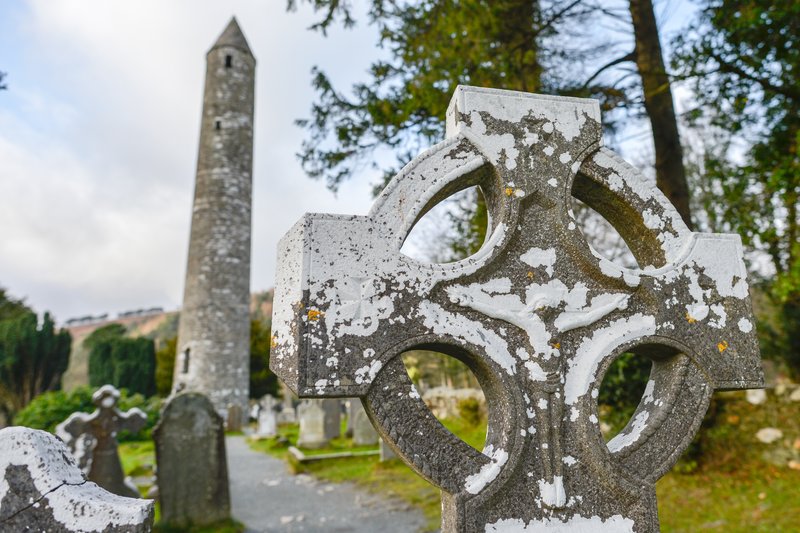彼时,爱尔兰重塑了世界文明

|
我很欣喜地在都柏林待了一周,正好碰上“布鲁姆日”庆祝活动,一年一度的“布鲁姆日”是为了纪念20世纪文学巨匠詹姆斯·乔伊斯的现代主义名著《尤利西斯》。周末前我离开了,但我探索了这座城,重走了布鲁姆在小说里走过的路,并对爱尔兰的文学传统给予了宽泛的思考,我想象着这个凯尔特人的岛屿,是如何在维护和传播学术思想中发挥了与众不同的重要作用,并让这些学术思想最终成为了西方文明的基石。 在乔伊斯之前,爱尔兰对世界文明已然重要,看看《凯兰书卷》便知。这一爱尔兰最珍贵的国宝,被存放在都柏林三一学院图书馆的负一层,房间内灯光昏暗,装饰复杂、牛皮页面的书卷,摊开在玻璃盖顶的展示台下。这一存本,展现了曾在几个世纪里席卷爱尔兰的波澜壮阔的修道运动,它见证了罗马帝国的衰亡,为后世保存了鲜活的文字、绘画等艺术经典。 多亏了爱尔兰,否则很多拉丁文典籍将随着岁月流转而消失,或者被烧毁在野蛮人的篝火里。某种意义上说,爱尔兰是对古老世界的智慧和文字的一个存储区,也是重塑文明的一个起点。一位名叫托马斯·卡希尔的学者,在他畅销了二十年的著作《爱尔兰如何拯救了文明》中就阐述了这一点。(这本书值得一读,尽管笔触不够生动。) 在都柏林,我不禁思考起在信息安全的大背景下,该如何面对这个国家的文化遗产。没有对数据的保存和保护,没有对有价值的信息资产的保障,谈什么网络安全呢?在有服务器和机器设备之前,僧侣和修道院在干保护的事,而在有骇客之前,维京人和西哥特人在干掠夺的事。爱尔兰人和它的书吏们,就是黑暗世纪里维护文明的些微灯火。 今日世界,工具将我们从繁琐劳动中解脱出来,它不断复制和翻刻着带有硅谷印记的各种知识,但那个从未消失的威胁——数据灭失和损坏——依旧存在。网络世界也挤满了掠夺者。 在这个布鲁姆日,我们可以从爱尔兰人那里学到有价值的一课,那就是:总是有备案。(财富中文网) 译者:宣峰 |
I had the pleasure of spending the week in Dublin, where Bloomsday festivities—the annual celebration of Ulysses, that modernist masterstroke of a novel by 20th century literary luminary James Joyce—are taking place. While I did not stay through the weekend, I did explore the city, retrace some of Bloom’s fictional footsteps, and generally ponder the Irish literary tradition—including the peculiarly essential role the Celtic island played in stewarding and disseminating a body of scholarship that would eventually serve as a foundation for western civilization. Ireland’s importance to the world of letters extends well before Joyce. Look no further than the Book of Kells. This national treasure is stored a floor beneath the Long Hall library at Trinity College, where the illuminated, bound-vellum pages lay splayed under a glass-capped dais in a darkly-lit room. The relic exemplifies the extraordinary monastic movement that in ages past swept Ireland and kept alive texts, classical and otherwise, in the face of the Roman Empire’s collapse. Were it not for the Irish, many Latin texts might have been lost to time—or burned in barbaric bonfires. In a sense, Ireland served as a restore point, a reboot for the inherited wisdom and writings of the ancient world. One Thomas Cahill, in fact, argued just this in his two-decade-old bestseller, How the Irish Saved Civilization. (It’s an engaging read, though it lacks nuance.) In Dublin, I could not help but consider the country’s heritage in the context of information security. What is cybersecurity but the preservation and protection of data? The safeguarding of valuable info assets? Long before computer servers and machines, there were monks and monasteries. Before hackers there were Vikings and Visigoths. Ireland and its scribes were a rare beacon at the onset of the Dark Ages. Today devices do much of the rote work for us—replicating and reproducing our silicon-inscribed knowledge—but the ever-present threat of data loss and corruption is no less real. Raiders swarm the wires. On this Bloomsday, we can learn a valuable lesson by Ireland’s example: Always have a backup plan. |













